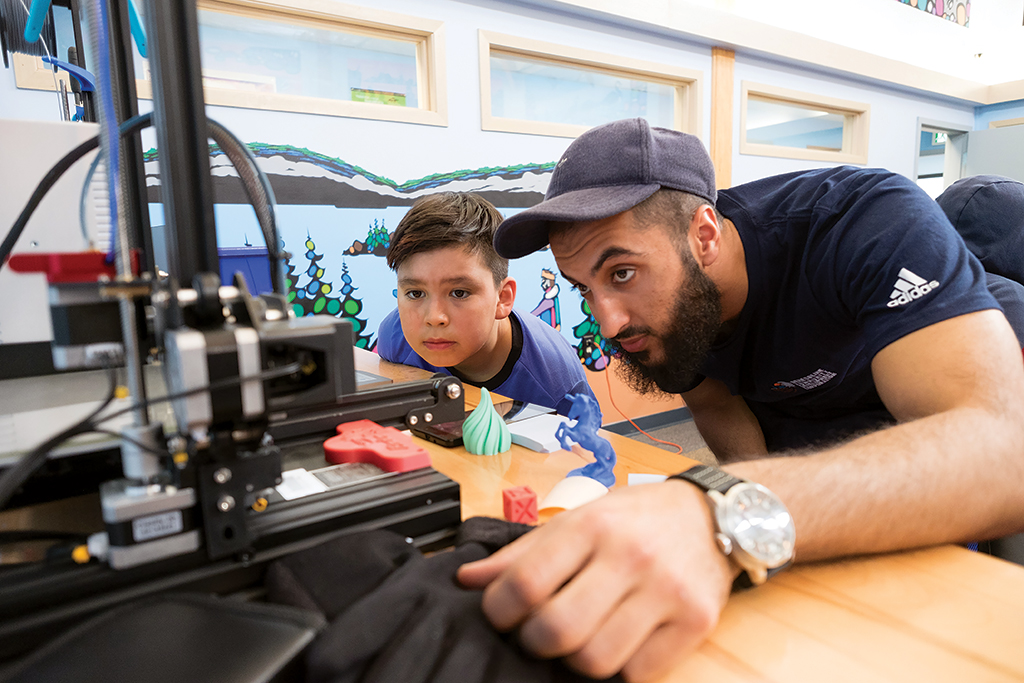
Denesoline Transforms Life in Lutsel K’e
From hi-tech fun to fresh food hampers and renewable power, the Lutsel K’e Dev Corp is making a big difference in every household
by Bill Braden
It’s like candy store stocked with hi-tech treats, and the kids are loving it. In the spacious meeting room at Denesoline Corporation’s office in Lutsel K’e, a dozen pre-teen youngsters are clamouring for a turn at an amazing collection of cutting-edge gadgets: virtual reality games, 3D printers, drone aircraft and laptop computers loaded with fun – and learning.
“I’m trying to make a cellphone case on the 3D printer,” says 12 year-old Delsin Clarke. “I’m learning how to print, and how use measuring and stuff. I like tech.” Across the room, which is decorated with vibrant murals by Dene artist John Rmbaugh, Nevada Catholique sports a big set of virtual reality (VR) goggles and waves her hands about, clutching a pair of remote joysticks. She’s watching as her VR hands manage the cashier’s till at an animated convenience store. “I like VR because it’s fun to play,” she says.
That’s the foundation of the DreamMaker Innovation Centre, says Haroon Bhatti, Innovations Coordinator with the Denesoline Corporation, the business arm of the Lutsel K’e Dene First Nation. He and Ronnie Bull, a Lutsel K’e computer graphics wiz, lead the once-a-week sessions.
“It’s based on the idea of edu-tainment. When kids are having fun at something, they’re learning,” says Bhatti, a London, UK born medical microbiology graduate who joined Denesoline in 2017. “The projects we’re doing are so exciting, it’s way better than sitting in a hospital lab!”
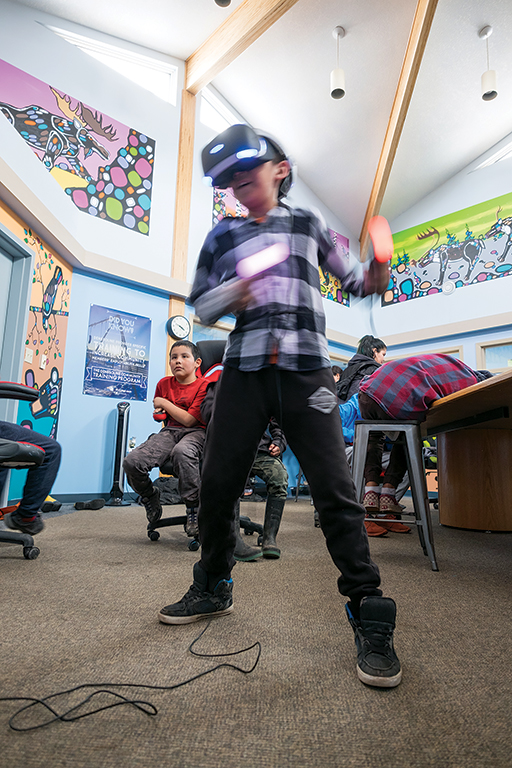
“ Any business has to be environmentally as well as economically sustainable”
Other Innovations, Too
The DreamMaker Centre is just one of a number of innovations that Denesoline Corporation has brought to the remote Dene community of about 300, roughly 200 km east of Yellowknife. Other projects range from helping youth attend cultural, sports and training events, to providing generous food hampers and cash distributions to every household, to scholarships and supporting women in leadership.
The DreamMaker project also fostered the “Wolf’s Den” competition earlier this year. Modelled on the television show Dragon’s Den, it invited would-be entrepreneurs to put their own dreams in front of a panel of business leaders. Six were chosen, with plans ranging from tourism to bookkeeping to home repair service, getting $2,500 cash awards plus support and mentoring from Denesoline. One of the happy recipients was 29-year old Shonto Catholique, who has ambitions of professional photography. Catholique used his prize to visit the British Columbia Institute of Technology and buy a laptop and photo software. “They’ve given me a chance and an opportunity to do what I want to do, and they offer a lot of help.”
Catholique echoes everyone’s appreciation for Denesoline setting up the East Arm Café in the community meeting hall. Along with a food truck that’s open in summer months, the Café offers tasty burgers, chicken and snacks and is a popular drop-in spot for locals and school kids. “Everybody loves getting a coffee there,” he says.
“There was no place to hang out… we show hockey games, cable tv and all the pay-per-view sports,” says Joseph Mukumba, the easy-going, Zimbabwe-born café manager since 2016. “We’re not making money… it’s more like giving to the community.”
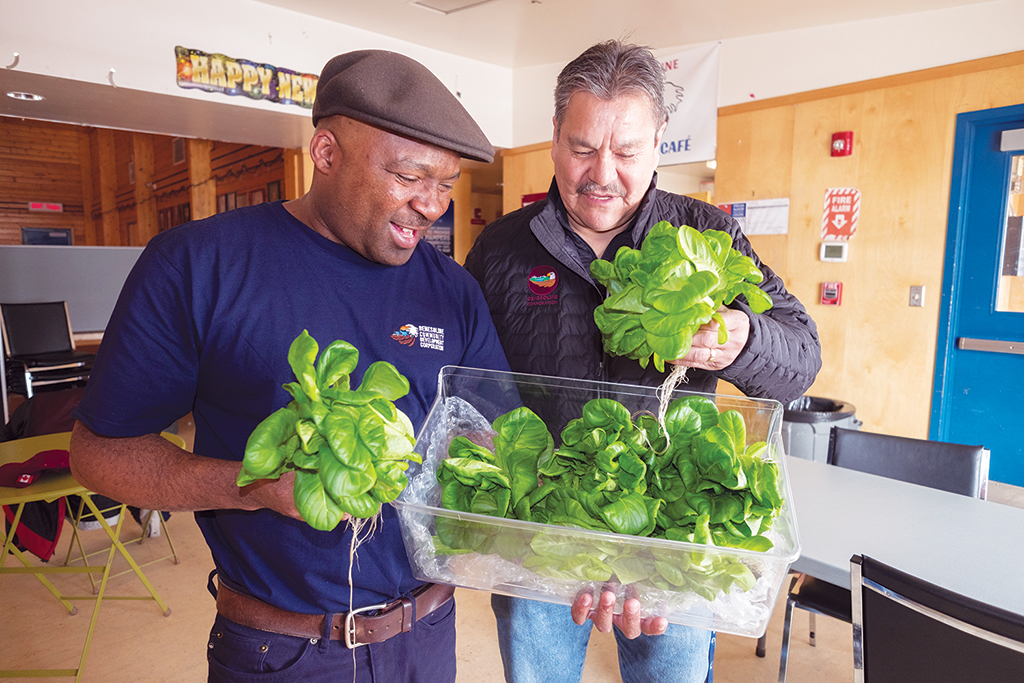
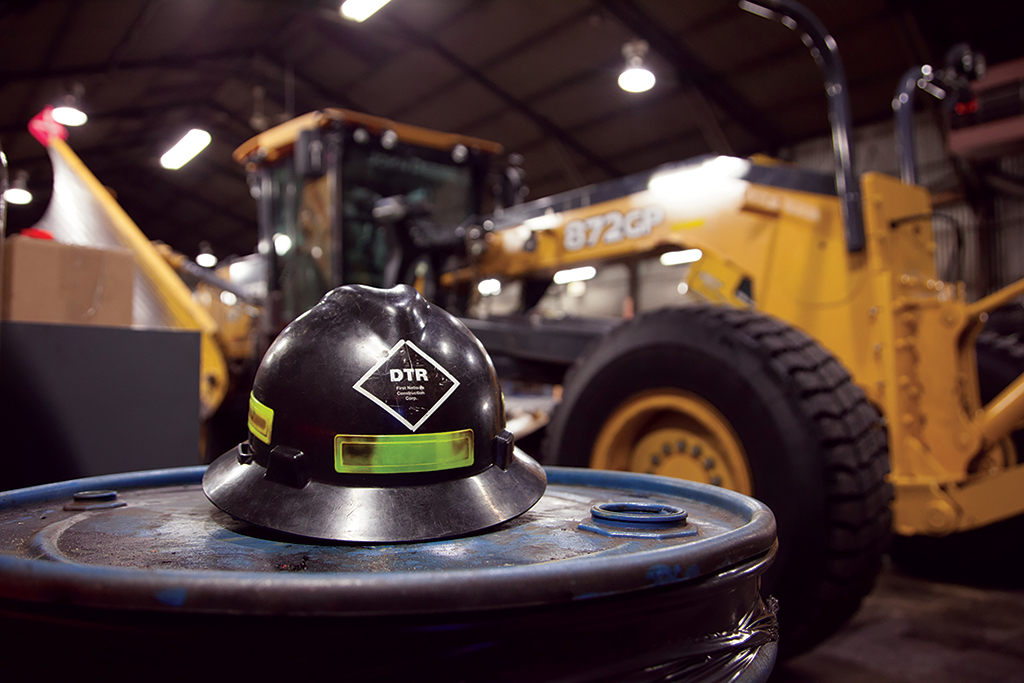
A vision to Make a Difference
The ambitious force behind these innovations is Ron Barlas, CEO of Denesoline Corporation and of its governing body, the independent, community-owned non-profit Tsa Corporation.
Barlas came to Denesoline in 2014 with schooling in business administration and psychology, plus 30 years’ global experience in manufacturing, international trade relations and building corporations. Competitive and laser-focused, Barlas has also worked with other Indigenous corporations. He was drawn to Denesoline because, unlike most others, it has a clean separation from the political community governments that usually control their own Dev Corps.
“This means we can independently focus purely on business,” he states. With a background that’s not routine among other First Nation corporation bosses, he’s bringing in some unconventional innovations.
His vision: “To give and empower and create hope and motivate the community by improving the quality of their lives.” And like the biblical parable, he adds, “and to teach them to catch a fish.” While Denesoline does not disclose its financial reports, Barlas says it has operated at a profit for the past five years, enabling it to put supports back into the community that he says amount to “the low-to-mid seven figures” annually. Those profits are generated from a dozen business ventures and alliances Denesoline has created over the years. These include transportation joint ventures with Air Tindi, Acasta HeliFlight and Arctic West Transport, and fabrication with Hay River-based Aurora Manufacturing.
Others have a major hand in mine and industrial supply: tires, lubricants, explosives, construction and engineering and forest firefighting. Combined, they provide hundreds of mainly seasonal jobs. The portfolio leader is the DTR (Denesoline-Tlicho Cho-Robinson Enterprises) First Nations Construction Company, created five years ago to capture a share of the $20 million yearly contract to build sections of the winter road to the diamond mines. Barlas says DTR’s entry into the project in 2016 brought innovations that have saved the diamond mines, which share in the road’s cost, millions of dollars.
While Denesoline has limited equity to put into these ventures, Barlas says its involvement gives the partnerships access to bidding opportunities that often require an Aboriginal participation component. And, the combined business and technical experience his team brings to the table can give an extra edge to the chances of winning the work.
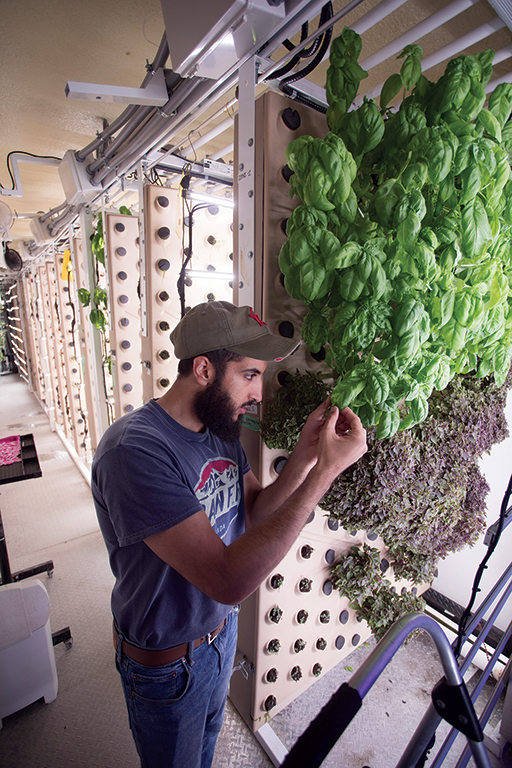
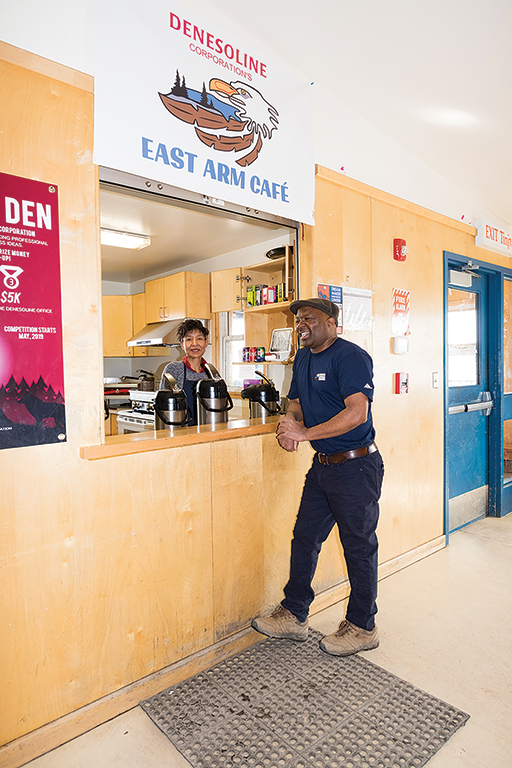
Environmental Passion Drives New Ventures
Along with Haroon on the innovations agenda, his father, Iqbal Bhatti, brings to the team a career in aerospace engineering and a passion for environmental advances. “We’re seeing more and more synergies with the environment,” says the elder Bhatti. This has prompted the Denesoline group to jump into three new fields: food supply, oil and hydrocarbon recycling, and clean energy on a community-wide scale. For the past year, Haroon Bhatti has been tending “The Farm”, a 15 metre-long semi-trailer converted into a self-contained, computer monitored greenhouse capable of operating year round. It can produce multiple crops a year of leafy greens, herbs and tomatoes. It uses aeroponic technology, where narrow, vertical plastic boxes are the plant ‘beds’, as the roots are fed by nutrient-rich water mists sprayed into the boxes. And like any farm, it will need daily tending, potentially creating another three jobs when it fully underway.
“There was a lot of R&D to adapt it to the North,” says Bhatti. “It was like a battle with the climate, from minus 40 to summer heat. The main goal is to introduce this as a fresh food supply for remote communities.” He has been selling test crops at the Farmers’ Market in Yellowknife, and has supplied the East Arm Café with fresh lettuce since the spring.
A smaller prototype trailer farm is being built and shipped to Lutsel K’e this barging season. Denesoline is also focused on bringing a new generation of cleaner energy technology to Lutsel K’e, and potentially to other NWT diesel-powered communities and mines. (The diamond mines alone consume some 100 million litres of diesel a year.) Based on a combination of wind, solar, hydro, batteries and diesel back-up, such an EMS (energy management system) “will provide clean electricity for generations to come, without the harmful emissions caused by fossil fuels,” Haroon said in a press release this July, when a $400,000 Natural Resources Canada grant was announced. An alliance between Denesoline, the British Columbia Institute of Technology, Yukon College, Ryfan Electric and Arctic Canada Construction will pursue an engineering and design study for this renewable, hybrid proprietary EMS. Iqbal Bhatti is convinced it will make a difference “of at least 50 per cent in fossil fuel demand within five years, guaranteed,” he states. Barlas adds, “Our goal will be to work with other Indigenous communities in delivering such a solution to them as well.” Also in the development stage is a Yellowknife-based plant to recycle used oils and lubricants. The containerized plant expects to process its first consignment (300,000 litres of engine oils) from the Ekati mine by the summer of 2020, recovering more than 80 per cent of it for reuse. Iqbal Bhatti hopes to attract byproducts from other industrial users, communities and commercial operations – even cooking oils from restaurants. He points out that the cost of backhauling used oils only as far as Yellowknife, instead of to southern processors, will be a major cost saving to customers. “It has to make business sense,” says Bhatti, “but any business has to be environmentally as well as economically sustainable. The main thing here is the environmental impact.”
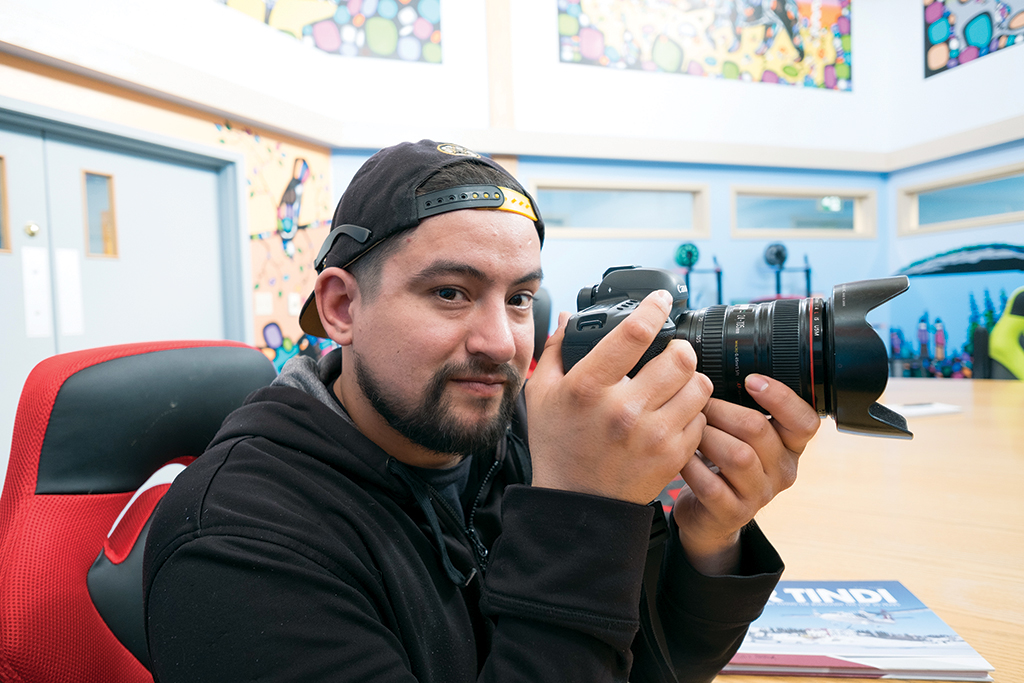
Future Focused On Youth
Denesoline has earned recognition at one of Canada’s highest levels for two consecutive years from Excellence Canada, a non-profit business development agency that promotes better business practice across the nation. Their 2019 and 2020 Business Excellence Awards for Private Businesses acknowledged the Corporation for its “strategic approach to successfully improving business performance and achieving goals, with a focus on the following three key performance areas: Delighted Customers, Engaged Employees, and Innovation.”
Lutsel K’e Dene First Nation Chief Darryl Marlowe also has high praise for the proactive job Denesoline is doing in returning benefits and distributions to beneficiaries. “The community has seen lots of benefits… the coffee shop, food security hampers, we’re really grateful. And with the Innovation Centre, Aboriginal youth don’t always have those opportunities, it opens up their eyes to what might be out there.” Chief Marlowe also notes that jobs taken up by residents makes a difference in a place where limited education holds many back. “We’re going to focus on the younger generation to help them get work in the future.”
“The community has never had anything like this before,” says Barlas. “Now they feel that somebody cares.” ABQ

